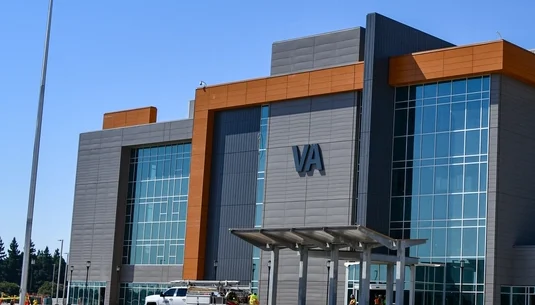VA Mental Health Services: Questions and Answers

The Department of Veterans Affairs is working to expand mental health resources for veterans and their families within the VA healthcare system.
According to the VA official site, over three years, there’s been an aggressive effort with the VA hiring “more than 9,000 mental health positions including psychologists, social workers, psychiatrists, licensed professional mental health counselors, peer support specialists, mental health nurses and mental health physician assistants…”
Many veterans and family members reenter civilian life in need of such services. There are outpatient care options, inpatient programs, telemedicine, and community-based veteran centers that can help. Here is a list of common questions about VA mental health services and options that can help you get started.
>>Never miss a benefits update. Subscribe to the MyMilitaryBenefits Newsletter NOW.
What is the overall aim of VA mental health services for Veterans and families?
The Department of Veterans Affairs provides many mental health services.
Services range from outpatient therapy and medication management to specialized programs for conditions like PTSD and substance use disorder. Immediate crisis support is available through the Veterans Crisis Line, offering a direct link to help at any time.
Vet Centers provide community-based counseling. They focus on readjustment and military-related concerns for Veterans and their families. The VA also utilizes technology to expand access through telemental health services, offering intensive residential programs for individuals requiring a higher level of structured care.
What mental health care options does the Department of Veterans Affairs provide?
The Department of Veterans Affairs offers a range of mental health services, including individual therapy, where a veteran meets one-on-one with a mental health professional. Various therapeutic approaches, like talk therapy, are used to address specific concerns. Group therapy is also offered. It allows patients to connect with peers and discuss common experiences in a structured setting led by a facilitator.
Medication management is part of outpatient care. Providers evaluate the need for psychiatric medications, prescribe them, and monitor their effects. These services address conditions like depression, anxiety, and general adjustment difficulties.
Veterans access these services after enrolling in VA healthcare, which can happen via a referral from their primary care provider or by contacting the mental health clinic directly.
Each care plan is developed collaboratively with a care provider. This plan takes into account their specific needs and circumstances. The aim is to provide ongoing support for mental health and daily functioning within a community setting.
How can I find VA mental health services, including outpatient care, PTSD programs, SUD treatment, telemental health, and RRTPs?
For most VA mental health services, the initial step is to connect with a local VA medical center or clinic. To find your nearest VA facility, visit the VA Facility Locator on VA.gov.
If you are already enrolled in VA health care, contact your VA primary care provider to discuss mental health needs or request a referral to mental health services. For general information about VA benefits and services, you can call 1-800-698-2411. For questions about VA health care eligibility and enrollment, call the Health Eligibility Center at 1-877-222-8387.
>>Never miss a benefits update. Subscribe to the MyMilitaryBenefits Newsletter NOW.
Are there specialized programs for Posttraumatic Stress Disorder (PTSD)?
The VA maintains specialized programs for Posttraumatic Stress Disorder (PTSD). This is due to its prevalence among the veteran population. These programs offer focused treatment.
Care for PTSD includes evidence-based psychotherapies, which are treatment methods with demonstrated effectiveness through research.
Examples of these therapies include Cognitive Processing Therapy (CPT) and Prolonged Exposure (PE). CPT involves examining and changing unhelpful thoughts related to a traumatic event. PE involves confronting trauma-related memories and situations in a structured way to reduce avoidance and distress.
Medication options are also available. They may be used to manage specific PTSD symptoms under a prescriber’s guidance. PTSD programs are available at nearly all VA medical facilities. They are often provided by specialized teams or dedicated PTSD specialists.
Access to these specialized programs generally begins with an assessment. A VA mental health provider evaluates the Veteran’s symptoms and determines the appropriate course of treatment.
The National Center for PTSD, a VA entity, helps with the research and development of these treatment approaches.
What kind of treatment is available for Substance Use Disorder or SUD?
The VA offers services for veterans experiencing issues with substance use. SUD is a health condition that can be managed with structured support and treatment. It is not treated as a legal issue at the Department of Veterans Affairs.
The care for SUD ranges from outpatient programs to more intensive residential settings. Outpatient SUD services include regular individual and group therapy sessions without requiring an overnight stay.
Therapies used include Cognitive Behavioral Therapy, helping patients identify and change thought patterns and behaviors related to substance use.
Motivational Interviewing is another approach, focused on helping patients identify reasons for change and recovery.
Medication-assisted treatment uses medications combined with counseling and behavioral therapies to address substance dependence.
These medications can help manage withdrawal symptoms, reduce cravings, and prevent a return to substance use. They are tailored to specific substances like opioids or alcohol.
These programs work to reduce or stop substance use. They also help develop skills for long-term recovery and improved health.
What is the Veterans Crisis Line, and how does it help?
For immediate support during distress, the Veterans Crisis is available to veterans, service members, and their families and friends.
The crisis line provides confidential support from trained responders. This support is for those in a mental health crisis, including thoughts of suicide or other severe emotional distress.
Access to the Veterans Crisis Line is provided through multiple channels. Call 988 and press 1, text 838255, or use online chat. This accessibility ensures help is available at any time.
The responders on the crisis line are prepared to listen, offer support, and connect individuals with further resources. These resources can be located within the VA or in the community, depending on the individual’s needs.
The service operates without requiring enrollment in VA benefits or healthcare. This provides a direct pathway to crisis support for many individuals connected to military service. The Veterans Crisis Line serves as the primary point of contact for urgent mental health situations.
What services do VA Vet Centers provide?
Vet Centers operate in community-based, non-medical settings to serve combat veterans, those who experienced military sexual trauma (MST), and their families. Services provided at Vet Centers are confidential.
The core offering includes individual and group counseling to address challenges related to transitioning from military to civilian life. Family and couples counseling is also available to provides support for interpersonal dynamics affected by military service.
Vet Centers offer bereavement (grief) counseling for families who have lost a loved one during military service. They also provide counseling for survivors of military sexual trauma, regardless of when or where the trauma occurred.
Vet Centers assist with medical and benefits referrals. They also offer employment assessment and referral. This acknowledges that these life aspects can influence mental well-being.
How can I contact a VA Vet Center?
Vet Centers offer readjustment counseling and related services.* You can call the Vet Center Call Center at 1-877-927-8387.
This line is available 24/7. To find a Vet Center near you, visit the Vet Center page on VA.gov.
How does the VA use technology to deliver mental health care?
The VA uses technology to expand access to mental health care through its Telemental Health Services. This method of care utilizes telecommunication technologies, including video conferencing and telephone calls. It connects patients with mental health providers when they cannot or prefer not to travel to a physical VA facility.
This option includes various types of virtual appointments, and the VA ensures these virtual connections are secure and private. Veterans can discuss these options with their VA primary care provider or mental health specialist.
What are Residential Rehabilitation Treatment Programs (RRTPs)?
For complex or severe mental health conditions needing a structured environment, the VA offers Residential Rehabilitation Treatment Programs (RRTPs). These programs are sometimes referred to as inpatient residential or domiciliary care.
RRTPs provide comprehensive treatment and rehabilitation services in a residential setting. Veterans live at the facility for a period while receiving care. These programs are for veterans experiencing significant mental health challenges that affect daily functioning and who need a supervised environment.
Conditions addressed in RRTPs include severe PTSD, complex depression, and substance use disorders. These may occur with other conditions, such as homelessness or unemployment.
Access to RRTPs typically follows an assessment by VA mental health professionals. They determine if this level of care is appropriate for a Veteran’s specific clinical needs.
>>Never miss a benefits update. Subscribe to the MyMilitaryBenefits Newsletter NOW.
About the author
Editor-in-Chief Joe Wallace is a 13-year veteran of the United States Air Force and a former reporter/editor for Air Force Television News and the Pentagon Channel. His freelance work includes contract work for Motorola, VALoans.com, and Credit Karma. He is co-founder of Dim Art House in Springfield, Illinois, and spends his non-writing time as an abstract painter, independent publisher, and occasional filmmaker.


